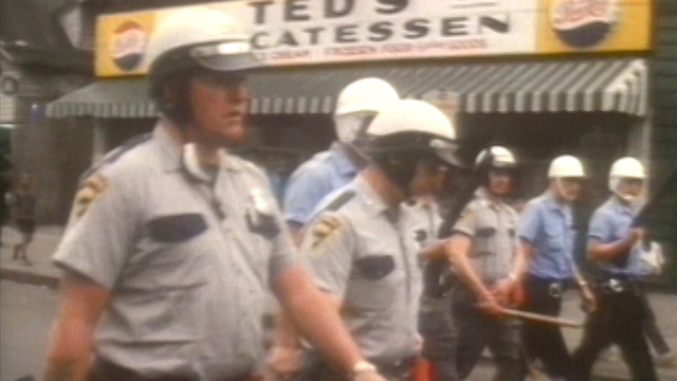We Need More than Power‘s Police Brutality Primer

Making a movie about police brutality in America is knowing that, by the time your movie comes out, your assessment will be both newly relevant and newly behind the times. It’s like making movies about elections, or recessions. It’d be like making a movie about mass shootings, but you could make a daily web series and still be out of date. It’s futile to try and keep up, and an act of repetition to lay bare the status quo. It’s lose-lose, with the best you can hope for being the education of a small demographic of people who don’t yet know how much they care. As we’ve recently seen on college campuses across the country (just writing this makes it immediately obsolete), filming the prime directive of the police—the violent maintenance of the status quo—will infuriate those already infuriated, cause those burned out to avert their eyes, and inspire inventive new lies from bootlickers. Maybe some people were finally radicalized by this heinous crackdown. I tend to think that the Dan Hodges quote about Sandy Hook and gun control applies here too: “Once America decided killing kids was bearable, it was over.” Director and co-writer Yance Ford (Oscar-nominated for his raw exploration of his brother’s killing in 2017’s Strong Island) offers timely and accessible analysis with his Netflix documentary Power. But when you’re grappling with a leviathan like America’s militarized police state, timely and accessible isn’t nearly enough.
Power, at its heart, is a brief history lesson, in as much as American history is a country’s evolving attempts to control its underclasses. This essay film takes us from the slave patrols to George Floyd in less than 90 minutes, and it’s still repetitive. Ford splits his arguments into sections, each with cheesy chapter title word-art that gives the whole thing a Bill Nye the Defund the Police Guy sheen. Around these section breaks, Ford imposes himself upon the documentary, with annoying fourth-wall break commentary and ponderous voiceover questions, nearly whispered. These pretentious diversions don’t make his words feel weightier, but rather attempt to turn the more cogent observations of Power’s talking heads—ranging from Harvard academics to journalists like Wesley Lowery—into mist.
When Power sticks to its experts, its case is compellingly assembled, its points lucidly made (backed up with archival images) and its unspoken importance undeniable. The unbroken tradition of the United States’ racist militarism is laid bare. Those now enforcing order are barely separated from those who hunted down the people defined by our laws as property, those who murdered the Indigenous people rudely blocking manifest destiny, and those who beat strikers back into the factories. The modernizing coat of paint caked onto the officers is still damp.
Over and again the same driving movies are underlined: Land and labor, labor and land. Once federal and state budgets, lobbies and votes get tied together, they form a Kevlar weave impenetrable by money-corrupted democracy.
As this capital-driven narrative is explained, its side effects logically unfold. Some are a bit more esoteric and deserve documentaries of their own, like the military tactics brought into American policing by a Spanish-American War vet. Others are unavoidably obvious. From defending the money machines and those who own them, the idea of American whiteness grows—and those on the verge of whiteness (like Italian and Irish immigrants) flock to policing as a tool to assure their place at the top, and to make that skin-saving shift from target to perpetrator. It’s a reminder that aligning with conservatism has long been seen as the “safe” path for legitimacy by those targeted by right-wing bigots.
But for some, the hate runs so deep that even this isn’t really an option. Power’s weakest accompany its only subject who leaves the interview space, a Black police officer in Minneapolis. We ride along with him on his patrol, see him check security cameras, and watch him discuss change with Black community leaders. It’s defanged and uncomfortable, and the moments where the officer expresses hopelessness around changing things from the inside as a Black man are dropped into dead air. His hints of bitter self-awareness barely sting, every aimless detour dedicated to his experience disjointed from the political throughline of the rest of the essay-film. The only other contemporary interview with someone who’s not a subject matter expert is a victim of aggressive Stop and Frisk tactics, whose experience is similarly released into space without much artistic direction. They add to the static buzz that every other participant is trying to cut through.
-

-

-

-

-

-

-

-

-

-

-

-

-

-

-

-

-

-

-

-

-

-

-

-

-

-

-

-

-

-

-

-

-

-

-

-

-

-

-

-








































